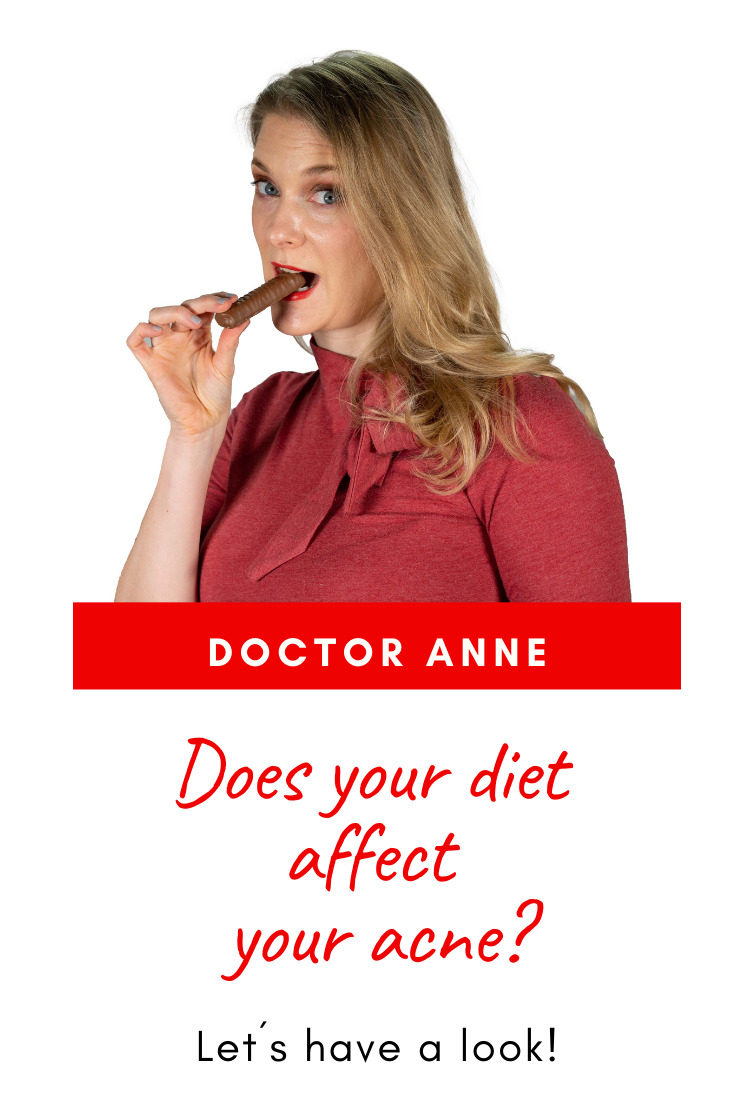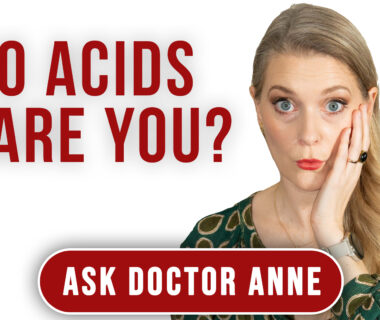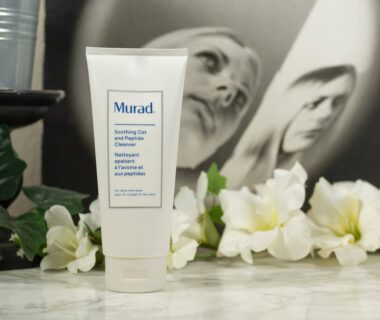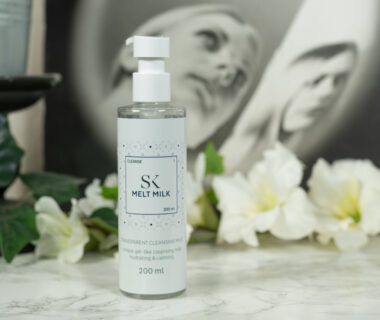Does your diet affect your acne? Or does it not matter what you eat, because acne is hormonal? Is chocolate leading to breakouts?
The answer is yes, your food choices influence your skin – but probably less than you think.

There is no denying that if you suffer from acne, certain changes in the way you eat will help with the severity of breakouts, but at the same time it should be crystal clear that if you suffer from acne, what you need to do is see a doctor – not randomly cut out food groups because some girl on YouTube told you so.
You see, acne is a complex topic and many different factors play a role to determine if you develop acne in the first place and if you do, how bad it is going to be.
And while those genetically blessed with acne-free skin might be able to eat whichever crap they like without ever getting a blemish, those of us that aren’t that lucky need to pay a little more attention. But while there are studies that support the link between diet and acne, they are not without flaw, something I will come back to a little later.
And as always in skincare: Moderation is key – a little indulgence never hurt anyone, food should be fun and stressing out about what you eat all the time might even give you stress acne. Treat your skin like you treat the rest of your body, feed it good stuff to thank it for the amazing work it does in keeping you healthy and if you occasionally want a piece of chocolate – by all means, have it.
With that said, let’s take a look at the two things everyone tells you to stay clear of – dairy and sugar.
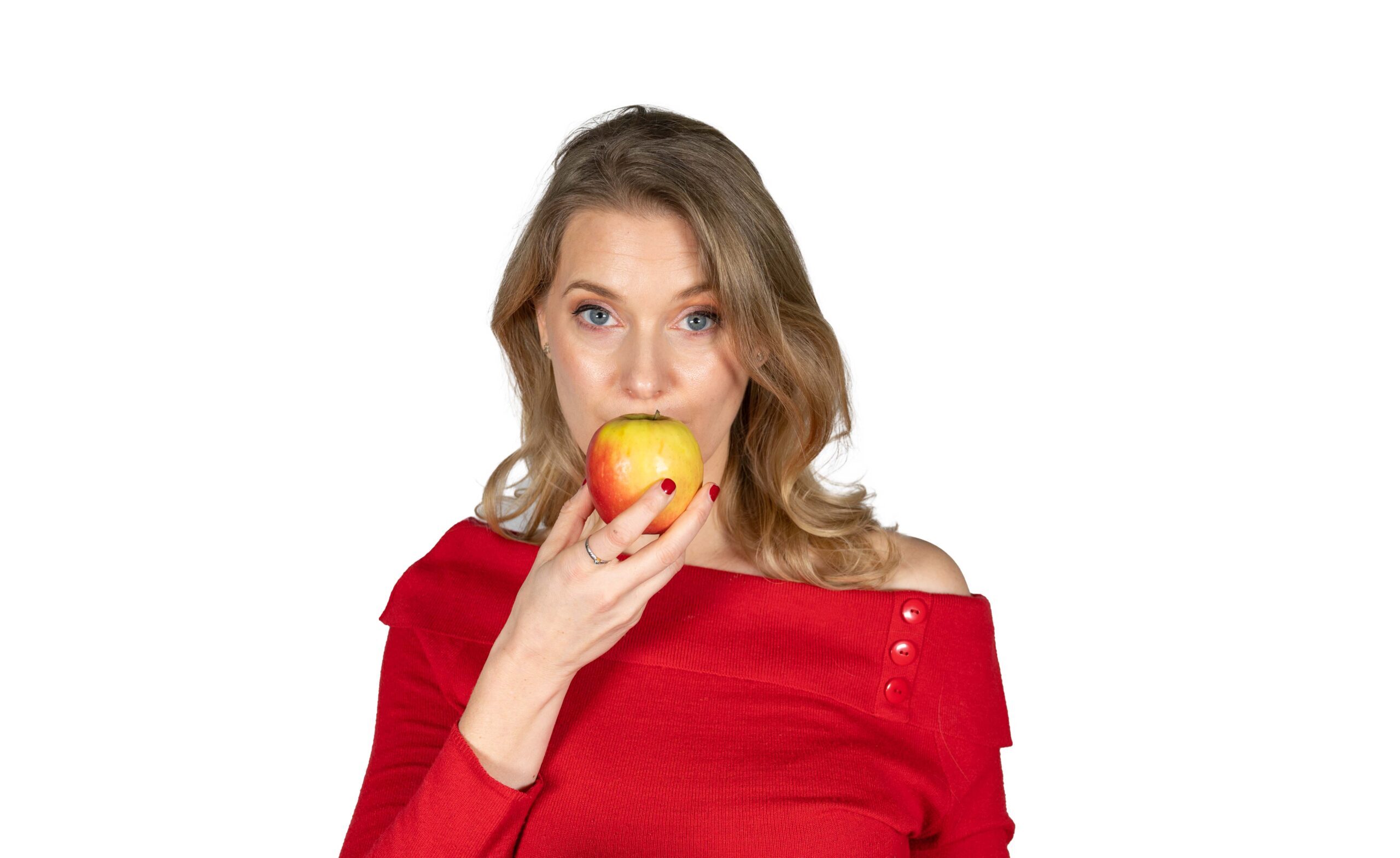
Why sugar aggravates acne
First of all, not all sugars are created equal, so eating an apple won’t have the same effect on your body that eating sweets has.
What differentiates these is their Glycemic Index or, even better, their Glycemic Load. And what exactly is that?
The Glycemic Index (GI) is a relative ranking of carbohydrates in foods according to how they affect blood glucose levels. Carbohydrates with a low GI value (55 or less) are more slowly digested, absorbed and metabolized and cause a lower and slower rise in blood glucose and, therefore usually insulin levels.
Glycemic load is a measure that takes into account the amount of carbohydrate in a portion of food together with how quickly it raises blood glucose levels, so it is a little more complex to determine.
Both basically are means to describe how quickly and how high your blood sugar rises after you consumed a certain food, which is important because the stronger and quicker the rise in blood glucose, the more Insulin and Insulin-Like Growth factor-1 (IGF-1) will be released, and this IGF-1, you might have guessed it, affects your skin.
How? It triggers cell proliferation, both inside the pore – more cells, more clogging and inside the sebaceous glands, where it increases oil production.
And the perfect recipe for breakouts? Lots of oil as breeding ground for bacteria and clogged pores where these bacteria can live undisturbed.
On top of that Insulin and IGF-1 are proinflammatory, so they aggravate any existing inflammation, which basically means insulin spikes create new breakouts and make the existing ones worse.
A long term effect of elevated insulin levels is the downregulation of certain receptors. This is a common adaptation process the body goes through – if there is a lot of a certain messenger over a long period of time, the body reduces the amount of receptors to which this messenger can bind, so it doesn’t get overwhelmed. So in order to get the same effect via this messenger, you need to have more of it, which is the mechanism that in the end leads to type II Diabetes: Your body adapts to a chronically elevated blood sugar level and the corresponding higher levels of insulin, reduces insulin sensitivity, which in turn means to lower the blood sugar, your pancreas needs to produce even more insulin, to which the body then adapts until your pancreas basically gives up.
For your acne something similar happens: Elevated levels of IGF-1 lead to a reduction in Insulin-like Growth Factor Binding Protein 3 (IGFBP-3), which means in turn higher free levels of IGF-1 with the above mentioned side effects.
Another factor that is discussed for aggravating acne lesions is that low levels of IGFBP-3 lower the effectiveness of natural retinoids in the skin, which means less cell turnover and less shedding and in the end again more clogged pores with more acne lesions.
Doesn´t sound too good, hm?
In short, spikes in your blood sugar lead to more acne lesions and more inflammation in the already existing lesions, and this effect is even worse if your blood sugar is chronically elevated. Keeping your blood sugar stable and your insulin levels low will affect the severity of breakouts.
The best way to achieve that is by eating foods with a low glycemic index or, if you don’t want to look that up, foods whose sugar is bound to fibre that needs to be broken down first rather than processed sugars that immediately get absorbed. Basically fruits and vegetables instead of cakes and gummy bears, which should not really surprise you.
But again, the occasional spike is fine, it is the dose that makes the poison.
Why dairy aggravates acne
Moving on to dairy, another food group that is often referred to as the reason you don’t have clear skin, and a great example that things are rarely black and white in science.
It goes without doubt that there is a link between dairy consumption and severity of acne – again, the dairy won’t give you acne, it will just worsen the acne you already have. But if that link is exclusively due to the dairy product consumed or due to other lifestyle factors still remains unclear. Yes, people with more severe acne consume more milk. But maybe they consume this milk with sugary cereals? Or their beverage of choice is hot chocolate rather than water?
In the end it is impossible to find two people with the same genetics and exactly the same lifestyle when it comes to food, sleep and stress with the sole difference being that one drinks three cups of milk a day and the other one doesn’t.
These limitations are clearly stated by the authors in studies like that, but they rarely make it into the news headlines.
Same goes for the people included in these studies: Are the results of a study done on 43 male Australians aged 15-25 easily transferable to a 42 year old German mother of two?
It is really important to be aware of these limitations before looking at what we know.
We do know that there is a link between dairy consumption and acne severity, with dairy meaning cows milk, especially skimmed milk, not cheese and yoghurt, and that there is a good explanation to why that might be true.
See, milk contains some Insulin-like Growth Factor, which we mentioned in the part about sugar, and it also contains bovine testosterone precursors that might affect our skin. The reason that this effect seems to be stronger with skimmed milk might be that there is more sugar present opposed to the full fat version, which again plays into the blood sugar rise and insulin spike mechanism.
Now you surely noted the use of “might” in the sentences before, and that was for good reason. Just because there is a link and we have a good explanation, that does not mean we have proof. We might be looking at it completely wrong, we might be missing something, but we should take it into consideration if we are struggling with acne.
For me personally, dairy as in cows milk does not play a huge role in what I eat anyway. I have a little bit with my oats in the morning, but don´t drink it by the cup and don’t notice any difference in my skin if I switch to something else over an extended period of time. What I eat a lot of is cheese, but that again has absolutely no effect on my skin or the amount and severity of my acne lesions.
I can say with confidence that I do not need to cut out dairy to improve my acne, but this is my very personal conclusion and might be entirely different for you, so if you want to know for sure, take a look at how much dairy you consume in the first place and then see if a reduction benefits your skin. Just keep in mind that dairy is a source of calcium – you can absolutely get enough calcium without drinking milk, I just recommend you check once that you consume enough nuts, leafy greens or calcium rich mineral water to be safe.
Do supplements affect your acne?
I actually touched on that topic already in my previous blogpost about the best foods and supplements for the skin, but want to quickly circle back and look at it from an acne perspective.
As acne is an inflammatory disease, it seems like a good idea to consume supplements that are antiinflammatory. One that is very popular and often recommended is Omega-3 Fatty Acids, mostly in the form of fish oil capsules. While there is not much data for “proof”, the main consensus is that it won’t hurt either, so you might want to try that.
Another one that has a little more backup is Zinc, so 30 mg of Zinc Gluconate per day is actually recommended by acne.org – fun fact: You get the same amount if you eat 130 gram of oysters, so if they are already part of your daily diet, you are good.
You will also find Selen mentioned in older recommendations, but again data is sparse, so it didn’t make it into the newer ones.
Another one that might actually aggravate your troubles though is Biotin – yes, the Hair and Nails hero available in the form of gummy bears. It is not the Biotin itself that makes acne lesions worse though, it is more the way it is absorbed or, more precisely, where it is absorbed. The body uses the same receptors for Biotin absorption than it does for Vitamin B 5 absorption, so if there is too much Biotin (more than 2.5 mg a day) that can lead to a deficiency in Vitamin B5 which again in turn might aggravate cystic acne.
Not really a supplement, but one that I feel deserves a mention here is Whey Protein, something many people interested in muscle growth consume. Apart from the fact that it tastes vile – personal opinion, but I can’t even stomach the chocolate flavour – it is also linked to an increase in acne severity. So if your efforts to grow your biceps or get ripped lead to acne on your back, maybe the protein shake you drink is partly to blame.
Bottom Line
Yes, what you eat affects your skin. No, you can´t completely clear your acne by avoiding certain food groups. If you suffer from acne, seeing a dermatologist and getting your prescription is always the best way to go.
To support that, eat a balanced diet rich in fruits and vegetables and low in processed sugar, it has multiple benefits for your overall health and could potentially ease your struggles with acne. But always remember that food is not only for the body, but also for the soul – don’t make it all about restrictions.
